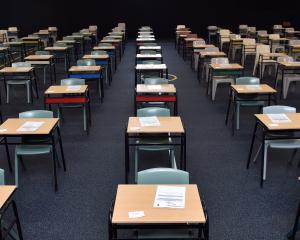Education Minister Anne Tolley yesterday announced plans to assess the idea of PPPs for the construction and maintenance of new schools needed in areas experiencing growing rolls.
A final decision was not expected until after a business model was examined next year, but Mrs Tolley said greater private involvement could cut costs and allow schools to focus on teaching.
However, New Zealand School Trustees Association Otago branch chairman Glenn Hutton told the Otago Daily Times he feared the move could put profits before schools' needs.
Establishment boards for new schools could be left dealing with a less-responsive private company, rather than the Ministry of Education, and the sense of community ownership and input for new schools could be eroded, he said.
The move could also result in a proliferation of "kit-set" designs for new schools being used, regardless of local needs, he feared.
"Private partners will be looking for a return on their investment, and where and how are they going to get that?
"I think the only way they can make money is the certain amount coming from the Government and doing it cheaper.
"My feeling is it is not a good idea."
He believed the proposal would not be "particularly relevant" in Dunedin, where no new schools were planned, and work was already under way in areas where there was growing demand, such as Queenstown.
Mrs Tolley dismissed the criticisms, saying the investigation of PPPs was not "an ideological thing" and would be supported by some principals frustrated by property matters, although others would be "wondering quite what it might mean".
There were already "hundreds . . . probably thousands" of PPPs operating in the education system, including some integrated schools and early child care centres, without problems, she said.
A lack of population growth meant it was unlikely demand for new schools would result in kit-set designs being used.
Only about eight new schools were planned in New Zealand over the next decade, she said.
PPPs would be considered only for "reasonably-sized projects", such as construction and maintenance of an $80 million high school, she said.
The ministry's contracts would also require the same standard of design, construction and maintenance for schools, and payment could include a performance-based component for private partners, she said.
Private partners would be responsible for building and maintaining schools and their property, and possibly also furnishings and security arrangements.
This already happened in Australia, she said.
The aim was to reduce the $500 million the ministry spent annually on school property, although it was too soon to say what sort of savings could be achieved, she said.
"The state of the books means we have got to look at everything we can to make sure we are getting value for money.
"However, if the project is not feasible, it will not go ahead."
Contracts in Australia were typically for 25, 30 or 35 years, with ownership reverting to the Government once they expired or if private partners failed, she said.
Labour education spokesman Trevor Mallard said the proposal was politically-motivated, would end up costing the Government more - rather than less - and would not have community support.
"It's short-term privatisation . . .
"Most Kiwis would prefer to have their children's schools owned by the Government, rather than some Chinese businessman."
Dunedin National Party list MP Michael Woodhouse rejected that, saying the Government had made a commitment there would be "no privatisation agenda at all" in this term, with the exception of allowing tenants to buy state houses.
But National was "the party of less government" and if privatisation was considered in future, it would be taken before the people at an election.
Mr Woodhouse said opponents of the plan were driven by political ideology.
Mrs Tolley's policy would mean the Government was still in control of what went on inside the buildings - the education of children - and that was "entirely appropriate".











